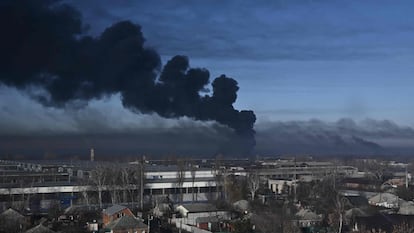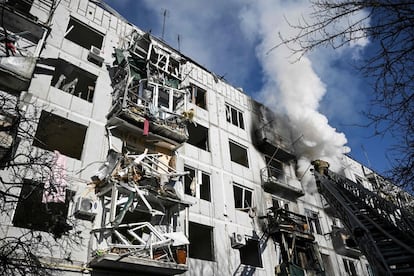Ukrainian officials report multiple incursions by Russian troops, after Putin finally launches invasion
Residents head to gas stations, supermarkets and ATMs after a tense night across the country. So far 40 deaths have been reported


Russian President Vladimir Putin has reached the point of no return. A few minutes before 6am Moscow time on Thursday (one hour before in Ukraine), the Russian leader announced a “special military operation” in Donbas. Just a few minutes after he made the speech, which was broadcast on all Russian state channels, there were major explosions in several areas in the east of Ukraine, from Sloviansk and Kramatorsk to Kharkiv, 30 kilometers from the Russian border, and even in Kyiv, the capital. Russian troops launched attacks in different parts of the country, using artillery, and both heavy and light weapons, with an estimated death toll of 40 people so far.
The Ukrainian Interior Ministry reported that Russian troops had arrived in the port city of Odessa and were also crossing the border in several parts of the country. According to Interior Ministry sources, they were making incursions from the Ukrainian peninsula of Crimea, which Russia illegally annexed in 2014.
In the capital, missile attacks were launched to target Ukrainian fighter planes based in an airport on the outskirts of the city of 2.8 million inhabitants, where some people were seeking protection in air raid shelters or in the metro.
Russian troops also crossed at Vilcha, between Belarus and Ukraine, located in the region of Kyiv and 150 kilometers from the Ukrainian capital. Putin’s “military operation,” which, according to the Russian leader is seeking to demilitarize but “not occupy” the country, is shaping up to be a major invasion. The Ukrainian president, Volodymyr Zelenskiy, has declared martial law and has closed the country’s airspace. “The army is doing its work,” he said. “No panic. We’re strong. We’re ready for everything. We will defeat everyone, because we are Ukraine.”
The Ukrainian state emergency service stated that in just an hour there were attacks launched against 10 Ukrainian areas, mainly in the east and south of the country. What’s more, the government confirmed that the Russian troops are also penetrating borders in the northwest of the country, specifically in the region of Chernihiv, on the border with Belarus.
The incursion from there, a place where Russia had deployed 30,000 troops to carry out joint maneuvers with Belarusian forces, has prompted fears among the Ukrainian and Western espionage agencies that Russian forces could be trying to reach Kyiv – this could be the shortest route.
According to the Ukrainian government, the assault has so far caused 40 deaths. “Information about the attacks is arriving constantly,” an official statement read. The Russian Defense Ministry, for its part, stated that it is using “high-precision weapons” to cripple the military infrastructure, air defense installations, military airfields and Ukrainian army planes, according to the Russian state agency RIA.
Putin, who has been arguing for months now that Kyiv is a “Nazi regime” that discriminates against Russian speakers and that citizens in the regions of Donetsk and Luhansk are suffering “genocide,” also stated that the military assault is to “defend and protect” the people.
Russian agency Interfax also reported explosions in the areas of Donetsk and Luhansk that are under the control of pro-Russian separatists. Backed by the Kremlin, they have been fighting against the Ukrainian army in a conflict that has already claimed 14,000 lives. A new “hot war” in the area would be devastating. A large-scale intervention in the entire country, a catastrophe.
Speaking on Thursday morning, Putin said that he was taking the decision after receiving a request for help from the Russian-backed leaders of the separatist areas in the east of Ukraine. On announcing the military operation, he warned: “To anyone who would consider interfering from the outside: if you do, you will face consequences greater than any you have faced in history. All relevant decisions have been taken. I hope you hear me.”

Hours earlier, in an emotional speech to the nation, President Zelenskiy appeared to suggest that the Russian invasion was coming. Kyiv is prepared to negotiate with Moscow via any channel and at any moment, he said via a speech in Ukrainian and Russian that was broadcast via his Telegram channel.
Wednesday night was tense in Donbas, and in the whole of Ukraine. Despite the concern of the United States and NATO, there has been skepticism in recent weeks about the chances of an invasion.
Once the first attacks had taken place on Thursday, residents of Slavyansk and Kramatorsk headed to gas stations to fill their tanks, to supermarkets to buy food, and to ATMs to withdraw cash. “It’s not panic, it’s forward planning,” said Olga Kubikova, 53. Like her, the residents of the Donbas region already lived through open warfare in 2014. “Unfortunately, we know what we have to do,” said Alexéi Udovenko, waiting in the long line at a gas station in Kramatorsk.
Since the end of November, Moscow has been deploying tens of thousands of troops on the Ukrainian borders – as many as 190,000, according to the latest information from the United States. Speaking on Thursday morning, Putin stated that clashes between Ukrainian and Russian forces were “inevitable” and “just a question of time.” In a belligerent tone, the head of the Kremlin added that an expansion of NATO and its use of Ukrainian territory are “unacceptable.” The Russian president also called on Ukrainian soldiers to lay down their arms.
Tu suscripción se está usando en otro dispositivo
¿Quieres añadir otro usuario a tu suscripción?
Si continúas leyendo en este dispositivo, no se podrá leer en el otro.
FlechaTu suscripción se está usando en otro dispositivo y solo puedes acceder a EL PAÍS desde un dispositivo a la vez.
Si quieres compartir tu cuenta, cambia tu suscripción a la modalidad Premium, así podrás añadir otro usuario. Cada uno accederá con su propia cuenta de email, lo que os permitirá personalizar vuestra experiencia en EL PAÍS.
¿Tienes una suscripción de empresa? Accede aquí para contratar más cuentas.
En el caso de no saber quién está usando tu cuenta, te recomendamos cambiar tu contraseña aquí.
Si decides continuar compartiendo tu cuenta, este mensaje se mostrará en tu dispositivo y en el de la otra persona que está usando tu cuenta de forma indefinida, afectando a tu experiencia de lectura. Puedes consultar aquí los términos y condiciones de la suscripción digital.








































